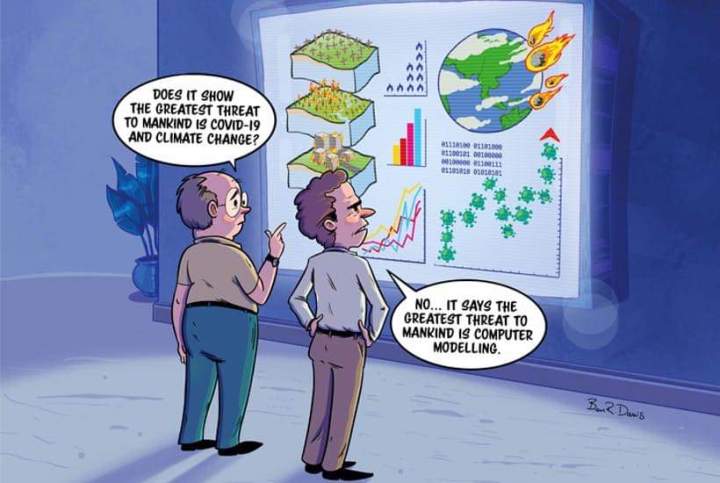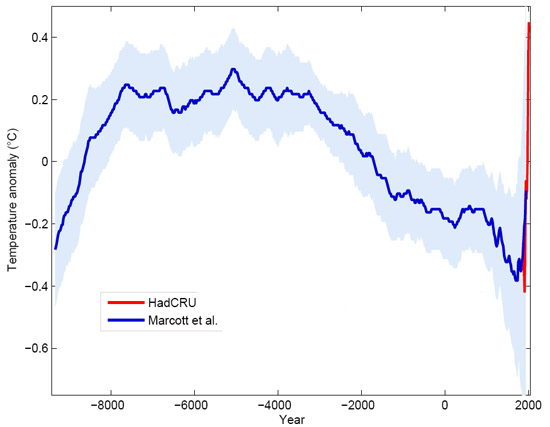When is this supposed to cut in? So far any such effect is way short of bringing climate to equilibrium; we've had about 1 C of post industrial warming and it is accelerating, not slowing down.
My point wasn't to argue that warming that produces more atmospheric moisture would bring cooling from more clouds. My point was to show how complicated the modeling requirements are since one variable (moisture) can have more than one effect on the climate as it can influence other variables (e.g. albedo?) and not in linear ways.
I'm not a climate (anthropogenic) denier; I'm an Average Joe that sees the Bandwagon effect affecting science, though not all of it's bad. I'm going to want more hard reasons to accept dramatic claims. As Sagan said, "Extraordinary claims require extraordinary evidence" (and reliable models). Models require predictions and how many of those have failed? This is unfortunate as it makes it tougher for quality science to garner the respect it deserves from all the other Average Joes. Some, perhaps you, admittedly, may have a better grasp of the accuracy of today's model, but are all the cards being put on the table in a fully transparent manner?
How many variables are in today's models? How may coefficients? How many of those variables have dependencies with other variables?
I'm not arguing that all or some or even one model is wrong, but I am less confident in any set of models that involves big money and acts in less than honest ways for their view of the good of society. Consensus science limits critical scrutiny almost always. Of course, that alone doesn't make them wrong.
I think this is a misunderstanding on your part. I doubt you would say models of Earth's seasons based on axial tilt are fishy because we cannot predict if a particular week in Spring is going to be warmer than average or cooler.
Perhaps given my immaturity on this topic. Nevertheless, assuming accelerated warming, wouldn't an average for any given week not be higher say over 10 years or 20 years? If not, why not?
You should look up ENSO - because a couple more La Nina's vs el Nino's within a 20 year period is enough climate variability to show less warming than the longer term trend, (and more el Nino's will make it exceed it). Predicting ENSO is proving difficult, so accurately predicting global surface temperatures for less than 20 years remains difficult. So far el Nino's and la Nina's are occurring in about the same frequencies as historical, so over longer periods the effect averages out - and longer term average warming is around the middle of the range of predictions.
Thanks, that's interesting. These events are more fodder for the models, yet if they are well understood, then those cycles should be predictable, thus a 10 year or 20 year estimate should be, eventually, attainable.
But anyone having taken a course in heat transfer will soon learn that a simple equation can quickly become very difficult to put into practice. Digital computers couldn't handle the math in my day, so we had to use analog computers. Those were simple heat problems.
But I don't see any room for fuzziness about whether OHC (as a measure and indicator of global warming) is likely to be warmer in 10 or 20 years - 1/10th of that, ie two years in a row of NOT going up is a notable exception to a steady rise -
How close are today's models when doing retrodictive analysis? How close a fit do they have on that 3-month average? If the fit is close, then perhaps the model may prove accurate for the future? I assume that physics can eventually handle this and that the Butterfly Effect isn't going to present a major barrier to accurate modeling.
Seems kind of obvious that most of the water ice melt ultimately makes it's way to the oceans but doing the math to confirm is worthwhile. I was tempted to leave this thread for use as a group think bubble - I'm doubtful any minds will be changed.
Hopefully I'm honest enough with myself when I say I'm open to learning, which is why you see me asking and not "telling" so much. I have no axe to grind or even a soap box. I've learned to work with anti-BBT folks, YEC, UFO believers, etc., and my hope is to have a serious understanding of what the state of the art truly is.





